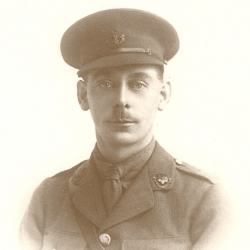Thomas Ainsworth was born on 26 December, 1894 in Great Hardwood, (5 miles North East of Blackburn), to Thomas Ainsworth Snr the manager of a cotton mill. Thomas was the youngest of six children and he was educated at Denstone College, in Staffordshire, where he was a member of the Officer Training Corps for 3 years between 1910 and 1912.
Thomas Ainsworth was commissioned as a Second Lieutenant into the 9th Battalion Manchester Regiment, Territorial Force on April 12, 1915. From June to July 1915 he attended an Officers training course at Balliol College, Oxford, residing at the college for a month. On October 8, 1915 he boarded His Majesty’s Transport Ship Demosthenes along with two other Officers and 134 other ranks bound for Gallipoli. They arrived at Mudros on October 20th and joined the Battalion at Cape Helles on October 22, 1915.
He survived Gallipoli unscathed and sailed with the Battalion to Egypt, arriving January 16, 1916. In Egypt he attended a 10-day school of instruction from May 28 to June 7, 1916 and he was later attached to the 126th Brigade Stokes Trench Mortar Battery on June 27, 1916.
He sailed with the Battalion to France arriving March 11, 1917. Shortly after arriving he took home leave in the UK for two weeks, from March 25 to April 8, 1917. Shortly after returning he attended a Trench Mortar School from April 13-24, 1917. On June 7th he was taken sick to hospital and remained there for 34 days. During this time, he was promoted to Lieutenant on July 1, 1917. Shortly after his return to the Battalion he was permanently attached to the 126th Brigade Trench Mortar Battery where he remained for the duration of the war. While serving with them, on October 15, 1917, he proceeded to the UK for 10 days leave.
He was mentioned in Sir Douglas Haig’s Despatch of November 8, 1918 and was awarded the Military Cross in the 1919 New Year’s Honors List. On April 1, 1919 he was awarded a Bar to his Military Cross the citation reads:
Awarded a Bar to the Military Cross:
Lt. Thomas Ainsworth, M.C., 1/9th Bn.
Manch. R., T.F., att’d. 126th L.T.M. By.
For marked gallantry and good leadership. At Braistre on 20th October, 1918, he led his section forward and, charging an enemy machine-gun post, killed the crew. His promptness of action on this occasion and later in assisting to clear up several machine-gun posts on the railway was of great value to the company to which he was attached.
(M.C. Gazetted 1st January, 1919.)
He resigned his commission on February 26, 1921 and retained the rank of Lieutenant.
In 1923 he married Elizabeth Baines and their son William Thomas Ainsworth was born in 1925. Their daughter Kathleen followed in December 1929. But by 1939, Thomas was widowed and living in Blackpool as a boarding house keeper, and looking after his two children.
On December 18, 1940 he was granted an emergency commission as a Lieutenant in the Royal Artillery and immediately attended a month’s training at the “Z” Battery Training Wing at Shrivenham, (133rd OTC Group, Royal Artillery, Anti Aircraft). He was then posted to the newly formed 127th Anti-Aircraft “Z” Battery at Nottingham (part of the 6th Anti-Aircraft “Z” Regiment) where he remained for 9 months, until September 1941. From here he was attached to the Depot of the 6th Anti-Aircraft Regiment at Woolwich for the next 3 months where he attended a short training course. In December 1941 he was posted to the 7th Anti-Aircraft Regiment in County Durham which was the location of the newly formed 228 Anti-Aircraft “Z” Battery, manned by a mixture of the Royal Artillery and the Home Guard. He remained there until April 25, 1942 when he was relegated to the unemployed list, finally relinquishing his commission on March 15, 9154.

